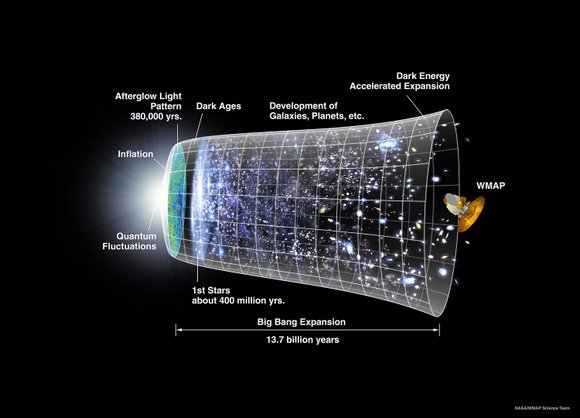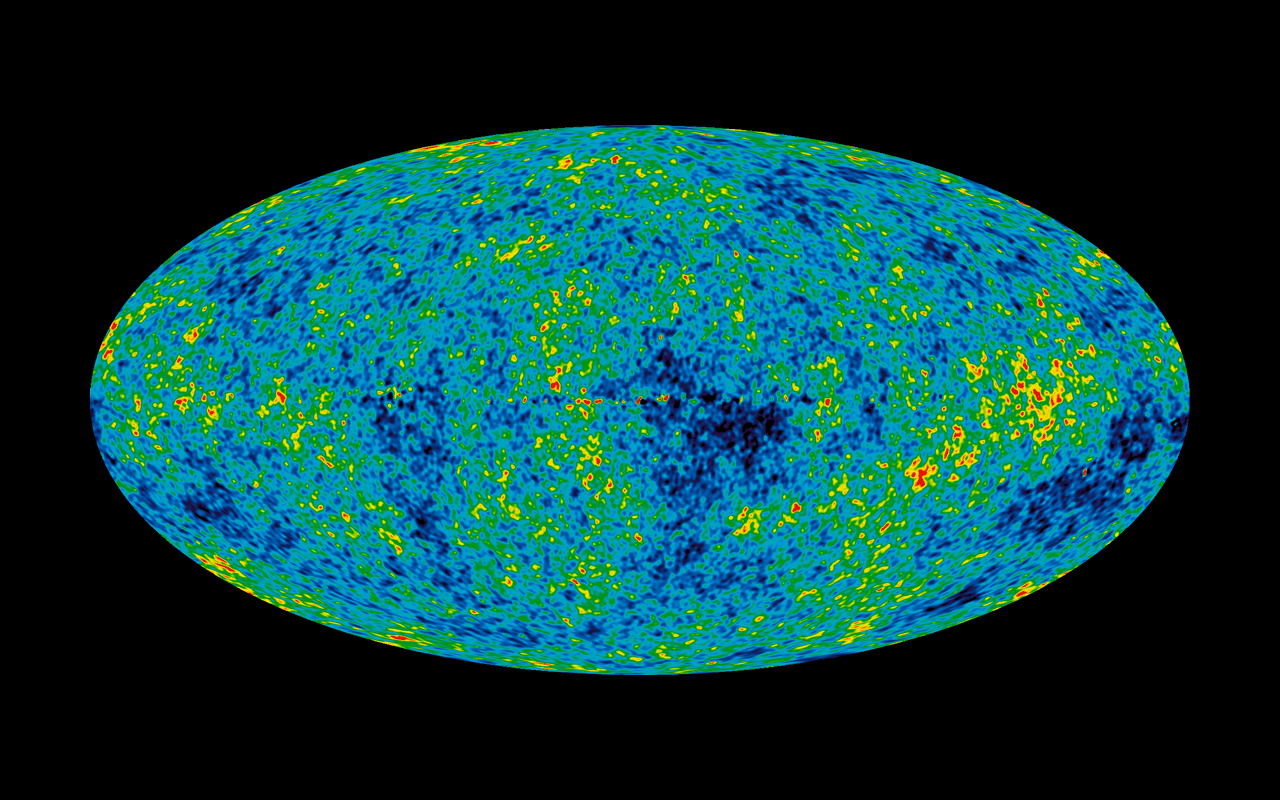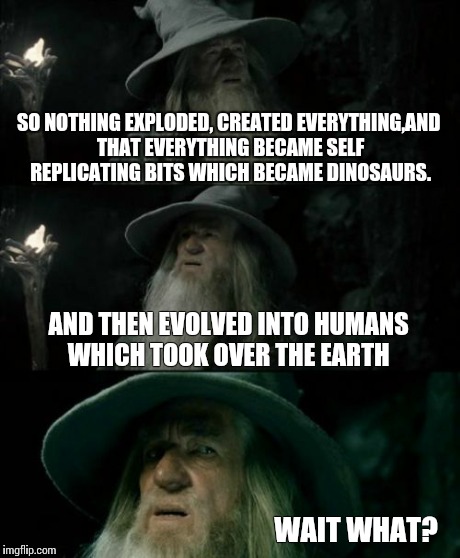It looks like you're using an Ad Blocker.
Please white-list or disable AboveTopSecret.com in your ad-blocking tool.
Thank you.
Some features of ATS will be disabled while you continue to use an ad-blocker.
share:
This is basically how Genesis Chapter one verse 2 and 3 are described With images.
This si what verse 2 describes:

This image describes verse 3. We could also Call this the big bang.

Illustration of the Big Bang.

Verse 6: Firmament THe WMAP describes the firmament/heaven. When we look up what we see we actually call heaven.

This si what verse 2 describes:

This image describes verse 3. We could also Call this the big bang.

Illustration of the Big Bang.

Verse 6: Firmament THe WMAP describes the firmament/heaven. When we look up what we see we actually call heaven.

originally posted by: Barcs
LOL! Longevity is not about surviving long enough to reproduce. It's about life expectancy AS A WHOLE. The vast majority of organisms reproduce within a couple years. If organisms could not survive long enough to reproduce they would have died out over a billion years ago. You are incredibly dishonest. The length of one's life after reproducing is COMPLETELY IRRELEVANT TO EVOLUTION and always was.
The lengths you will go to avoid admitting you are wrong are absolutely astonishing. Mind-boggling even.
Without an increase in longevity, there would not be ample time for development. If a tiger lived as long as a fly it would die as a baby without the chance to reach sexual maturity. So yes, the obvious answer is that an increase in longevity would have been necessary, in theory, to allow more complex organisms to arise. Therefore longevity would have been a part of evolution, according to your own theory. If you are going to try to argue this I am going to have to boycott responding to you, because it proves you deny obvious facts to try to avoid admitting you were wrong.
originally posted by: cooperton
originally posted by: Barcs
LOL! Longevity is not about surviving long enough to reproduce. It's about life expectancy AS A WHOLE. The vast majority of organisms reproduce within a couple years. If organisms could not survive long enough to reproduce they would have died out over a billion years ago. You are incredibly dishonest. The length of one's life after reproducing is COMPLETELY IRRELEVANT TO EVOLUTION and always was.
The lengths you will go to avoid admitting you are wrong are absolutely astonishing. Mind-boggling even.
Without an increase in longevity, there would not be ample time for development. If a tiger lived as long as a fly it would die as a baby without the chance to reach sexual maturity. So yes, the obvious answer is that an increase in longevity would have been necessary, in theory, to allow more complex organisms to arise. Therefore longevity would have been a part of evolution, according to your own theory. If you are going to try to argue this I am going to have to boycott responding to you, because it proves you deny obvious facts to try to avoid admitting you were wrong.
Dude, none of that is an issue. If it was, no life would exist. Life expectancy is about an entire life, not just reaching reproduction. Your denial of basic reality is hilarious. Sometimes I think you are Stephen Meyer himself.
originally posted by: Barcs
a reply to: spy66
Actually the big bang did not emit light. That was long before stars and other light producing things existed. It emitted heat, but not light.
Well, heat is not in the visible spectrum but it can be transmitted by infrared radiation in the form of photons the particles of light. It wouldn't surprise me if there were a few photons within the visible spectrum.
But after the universe had cooled (it took sometime between 10^−36 and 10^−32 seconds) the weak and electromagnetic fields split, and the first true photons formed.
These photons didn't get very far before colliding with other particles that were being formed. As you note, it took nearly 400000 years until the universe cooled enough to become transparent.
Now you mention visible light. The photons formed after the split would have had very high energies, we would call most of them gamma rays if they existed today. But as photon of all energies could be formed, a small fraction would have been in the visible range.
At recombination, when the universe became transparent, the temperature was about 3000K, at which temperature most photons are in the infra red range, but enough are visible to have given the universe a very bright orange-red colour, similar to the colour of a lightbulb.
astronomy.stackexchange.com...
Seems like there was some visible light soon after the big bang within fractions of a second but it took a few thousand years for the universe to become transparent.
originally posted by: Barcs
Dude, none of that is an issue. If it was, no life would exist. Life expectancy is about an entire life, not just reaching reproduction. Your denial of basic reality is hilarious. Sometimes I think you are Stephen Meyer himself.
If all organisms lived as long as a microbe, there would be no diversity at all. Therefore, evolution, in theory, would have required an increase in longevity along the way. I don't understand why you are arguing this.
originally posted by: cooperton
originally posted by: Barcs
Dude, none of that is an issue. If it was, no life would exist. Life expectancy is about an entire life, not just reaching reproduction. Your denial of basic reality is hilarious. Sometimes I think you are Stephen Meyer himself.
If all organisms lived as long as a microbe, there would be no diversity at all. Therefore, evolution, in theory, would have required an increase in longevity along the way. I don't understand why you are arguing this.
Wrong because life has always been able to live long enough to reproduce, anything that did not was unable to pass down genes and thus irrelevant to long term evolution.
I just find it fun to highlight the hilariously wrong / completely invalid things you say in defense of your faith.
edit on 1 24 19 by Barcs because: (no reason given)
originally posted by: Barcs
anything that did not was unable to pass down genes and thus irrelevant to long term evolution.
exactly. So therefore an increase in longevity, theoretically, would have been necessary in evolution.
edit on 24-1-2019 by cooperton because:
(no reason given)
originally posted by: cooperton
originally posted by: Barcs
anything that did not was unable to pass down genes and thus irrelevant to long term evolution.
exactly. So therefore an increase in longevity, theoretically, would have been necessary in evolution.
You are the most stubborn person I have ever talked to. You literally just go "Nuh-uh" to anybody that ever refutes your claims. You are wrong. The increase in longevity was never necessary.
originally posted by: cooperton
originally posted by: Barcs
The increase in longevity was never necessary.
So all organisms today live the same age as the theoretical primordial microbe?
Of course not. Therefore, longevity had to increase to allow more complex development.
There was never a point where they could not live long enough to reach reproduction. If there was they went extinct, they didn't just evolve on the spot to live longer.
edit on 1 25 19 by Barcs because: (no reason given)
originally posted by: cooperton
originally posted by: Barcs
There was never a point where they could not live long enough to reach reproduction.
Because increased longevity would have been a necessity
No it wouldn't. It is something that happened, but it wasn't an evolutionary necessity. As I already explained life expectancy includes an organism's entire life, not just the time prior to reproduction. Evolution is only concerned with leading up to reproduction and since that was never an issue, there was never evolutionary pressure for that, aside when an environment change and an organism goes extinct.
edit on 1 25 19 by
Barcs because: (no reason given)
a reply to: Murgatroid
So nothing exploded,created everything, and that everything became self replicatingbit which became dinosaurs...
Thanks for reminding me WHY I quit taking this 'science' seriously...
Name a reputable scientist or peer review paper saying everything came from nothing?
Like seriously!!! However, on the otherside...
Show me a nothing we have detected to determine that something can, or cannot, come from nothing?
Yeezus Crimps mi lord.
Thanks for reminding me WHY I quit religion.
Coomba98
So nothing exploded,created everything, and that everything became self replicatingbit which became dinosaurs...
Thanks for reminding me WHY I quit taking this 'science' seriously...
Name a reputable scientist or peer review paper saying everything came from nothing?
Like seriously!!! However, on the otherside...
Show me a nothing we have detected to determine that something can, or cannot, come from nothing?
Yeezus Crimps mi lord.
Thanks for reminding me WHY I quit religion.
Coomba98
edit on 27-1-2019 by coomba98 because: (no reason given)
edit on 27-1-2019 by coomba98 because: (no reason
given)
originally posted by: Murgatroid
originally posted by: TzarChasm
Almost like this universe fell out the butt of a black hole.
Actually makes MORE sense than evolution does.
Thanks for reminding me WHY I quit taking this 'science' seriously...
Do you ever post anything that's NOT a straw man?
originally posted by: cooperton
originally posted by: Barcs
There was never a point where they could not live long enough to reach reproduction.
Because increased longevity would have been a necessity
Longevity is not required for anything, except to ensure you pay off your mortgage or whatever the organism equivalent is - most likely creating many generations instead of just one.
The most important factor is reaching sexual maturity so you can create offspring, and if necessary provide parenting until they can also reach sexual maturity to produce offspring. When that happens depends on their metabolic rate and the ratio of first generation sexual maturity versus lifespan.
By comparing two entirely different organisms (flies and tigers in your case) you’re only demonstrating your ignorance. If a tiger had the same life expectancy, metabolic rate and sexual maturity as a fly they would likely produce cycles of offspring at exactly the same rates, with the difference being that flies produce dozens of offspring and tigers only a few.
Where is Toolman to defend his thread?
Also, where is the report button? I strongly object to someone calling me an idiot because I don’t share that person’s opinion. I find it laughable that he even links a decorum post from the forum owners in his signature, yet uses language that clearly does not conform to the nature of that post.
Where are the moderators.
Also, where is the report button? I strongly object to someone calling me an idiot because I don’t share that person’s opinion. I find it laughable that he even links a decorum post from the forum owners in his signature, yet uses language that clearly does not conform to the nature of that post.
Where are the moderators.
new topics
-
Rep. Alexandria O. Cortez Says Forcing People to Use The Correct Bathroom is Dangerous.
US Political Madness: 5 hours ago -
Cooperation zones
World War Three: 6 hours ago -
Ok this is some BS now WTH
Rant: 8 hours ago -
France gives Ukraine license to fire long-range missiles at Russia
World War Three: 10 hours ago
top topics
-
France gives Ukraine license to fire long-range missiles at Russia
World War Three: 10 hours ago, 9 flags -
Most INSANE internet rabbit hole
Secret Societies: 14 hours ago, 8 flags -
Rep. Alexandria O. Cortez Says Forcing People to Use The Correct Bathroom is Dangerous.
US Political Madness: 5 hours ago, 4 flags -
Ok this is some BS now WTH
Rant: 8 hours ago, 3 flags -
Cooperation zones
World War Three: 6 hours ago, 3 flags -
Stalker 2 - Review from a Veteran
Video Games: 13 hours ago, 2 flags -
Does anyone have a link to download apple pay for androids
General Chit Chat: 14 hours ago, 1 flags
active topics
-
-@TH3WH17ERABB17- -Q- ---TIME TO SHOW THE WORLD--- -Part- --44--
Dissecting Disinformation • 3365 • : RelSciHistItSufi -
Ok this is some BS now WTH
Rant • 7 • : billxam1 -
Rep. Alexandria O. Cortez Says Forcing People to Use The Correct Bathroom is Dangerous.
US Political Madness • 16 • : Astrocometus -
France gives Ukraine license to fire long-range missiles at Russia
World War Three • 14 • : Astrocometus -
Cooperation zones
World War Three • 13 • : VariedcodeSole -
Mood Music Part VI
Music • 3714 • : Hellmutt -
Inca stone masonry at Sacsayhuaman, Ollantaytambo and the Sun Temple
Ancient & Lost Civilizations • 15 • : randomtangentsrme -
Dr Cambell talking about using worm meds for cancer
Medical Issues & Conspiracies • 24 • : ADVISOR -
President-Elect TRUMP Picks Former Florida A.G. PAM BONDI to be U.S. Attorney General.
2024 Elections • 65 • : VariedcodeSole -
Well, here we go red lines crossed Biden gives the go ahead to use long range missiles
World War Three • 332 • : Tolkien

